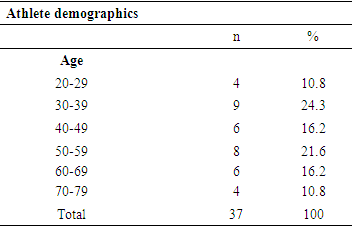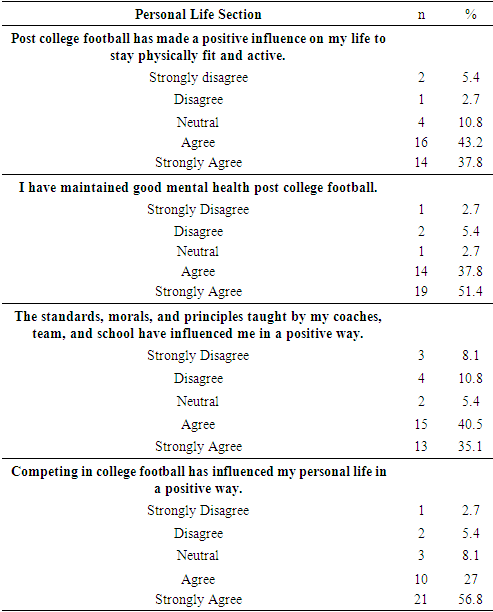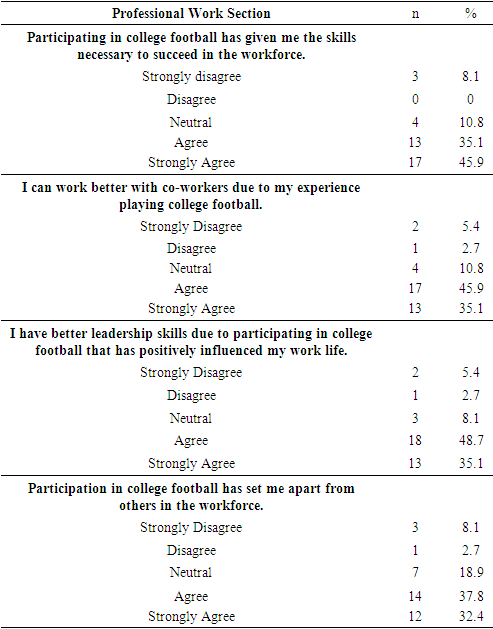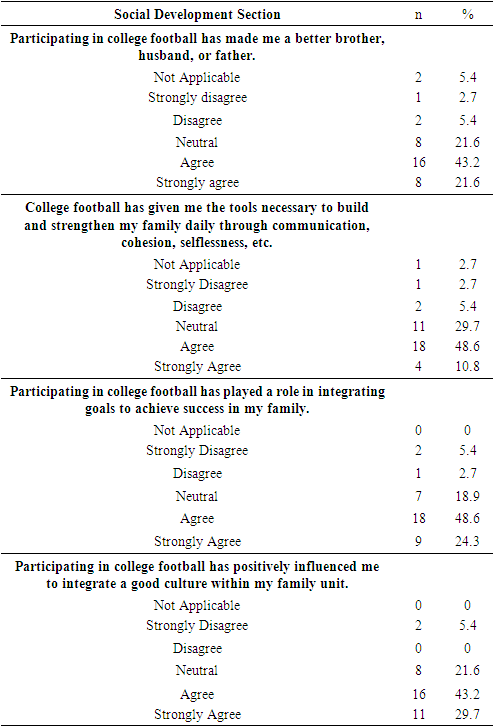-
Paper Information
- Paper Submission
-
Journal Information
- About This Journal
- Editorial Board
- Current Issue
- Archive
- Author Guidelines
- Contact Us
International Journal of Sports Science
p-ISSN: 2169-8759 e-ISSN: 2169-8791
2023; 13(2): 36-41
doi:10.5923/j.sports.20231302.03
Received: May 24, 2023; Accepted: Jun. 8, 2023; Published: Jun. 12, 2023

A Reflection Examining the Positive Influence of Past Sport Participation
Garrett Kovach, Mark DeBeliso
Southern Utah University, Cedar City, Utah, USA
Copyright © 2023 The Author(s). Published by Scientific & Academic Publishing.
This work is licensed under the Creative Commons Attribution International License (CC BY).
http://creativecommons.org/licenses/by/4.0/

Sports play a role in the development of an athlete’s ability to succeed outside of the game. This study is a reflection examining the positive effects of past sport participation in former college football athletes. Purpose: The purpose of this study is to understand how involvement in the sport of football has impacted former athletes in a positive way and whether that positive influence has shaped the way they perform and interact in the workplace, family environment, and their personal life. Methods: June 17th 2022, a Google Survey was sent to alumni Southern Utah University football athletes. There were 37 male participants from ages 24 to 75 years old. The survey contained 12 questions consisting of the personal, professional, and social development of the athlete. The participants had 4 weeks to complete the survey. Results: During the 4 weeks that the survey was active, 37 participants responded, all male athletes who previously played football at Southern Utah University. The first section of questions was a reflection on the athlete’s personal life. Regarding staying physically fit post sport participation 43.2% agreed college football was a positive influence. Those who strongly agreed sports helped them maintain good mental health was 51.4%. Approximately 40.5% of participants agreed the standards, morals, and principles taught by coaches, team, and school influenced them in a positive way. Additionally, 56.8% strongly agreed college football influenced them in a positive way. The second section addressed professional work, where 45.9% strongly agreed college football gave them the skills necessary to succeed in the work force. Forty-five-point nine percent agreed college football allowed them to work better with co-workers. Just as important, 48.7% agreed that they gained leadership skills from participation in college football and 37.8% agreed that college football has set them apart in the workforce. The third section addressed participant’s social development, where 43.2% of participants agreed that college football made them a better brother, husband, or father. Additionally, 48.6% of the participants agreed that football gave them the tools necessary to build and strengthen their family through communication, cohesion, selfishness, etc. Likewise, 48.6% of participants implemented goals in their families and 43.2% of participants agreed that college football influenced them to integrate a good culture within their own family. Conclusion: Within the parameters of this study, characteristics such as teamwork, hard work, goal setting, leadership, and cohesion appear to be beneficial towards personal, professional, and social development. Each athlete’s sports sojourn differs from that of another, but past sport participation can be a positive influence.
Keywords: Past sport participation, Personal, Professional work, Social development
Cite this paper: Garrett Kovach, Mark DeBeliso, A Reflection Examining the Positive Influence of Past Sport Participation, International Journal of Sports Science, Vol. 13 No. 2, 2023, pp. 36-41. doi: 10.5923/j.sports.20231302.03.
Article Outline
1. Introduction
- Sports play an important role in the modeling and shaping of an athlete’s future. This modeling and shaping comes through years of participation that creates an important foundation for life post-graduation. The foundation starts with the athlete’s journey at a young age competing in recreation leagues and continuing to progress through middle school, high school, college, and possibly professionally. It is reported that there are 8 million high school athletes and roughly 480,000 collegiate athletes in the United States. Most of these athletes’ careers end in high school and college with fewer than 2% continuing professionally [1,22]. Though playing sports professionally may not be the primary pursuit for each athlete, the training, skills, and attributes gained in the process provide athletes with the potential to succeed in varies stages of life. Certainly, these reports demonstrate that participating in sports creates more value than just on the field accolades. An athlete’s participation in sports provides them with the skillset necessary to be an attributable member in the workplace, society, and in their families.Participants who are part of a team endure physical and mental development during training to improve their performance [3]. Those skills that have been learned and acquired benefit an individual more than just participating in the sport itself and may prove beneficial to other venues in life. Not to mention there are other skills acquired such as resilience, self-reflection, and emotional regulation. Specifically, resilience, is a vital attribute in achieving goals through sustaining healthy habits [4]. Life has many challenges and difficulties, some of which test the inner core of an individual who may need to trust the resilience they have an acquired from sports to push through the hardships of life to achieve a goal. The physical and psychological demands of sports also provide a framework for athletes to carry post athletics. These frameworks are supported through longitudinal studies that assessed athletes who participated in sports showing mental strength and preventing physical functional decreases [5,6]. It is beneficial to participate in sports because it is more than skill development. Sports can have a positive effect on the human body if former athletes maintain a healthful living through the exercise training learned in the sport. Athletes not focusing on professional sports don’t necessarily need to push their bodies to extreme limits to reach a peak performance, but they can reap the health benefits of continuing to maintain a healthy diet, engage in resistance training, aerobic, and anaerobic activities, and even participating in recreational sports. Above all it is suggested that sport participation can influence mood and is found that those who participated in team sports have greater life satisfaction and extroversion compared to those who haven’t participated in sports [6]. As discussed, the suggestions to live with a good physical and mental health is beneficial through the pursuits of life. Sports can be that path for athletes to build those healthy frameworks. Additionally, the advantage of past sport participation includes a background of leadership, teamwork, goal setting, and determination. Teamwork and leadership are closely related in the sense that collaboration with others is benefited to achieve a specific goal [3]. Team sports encourage athletes to step up and lead the group to success. The sport of football particularly focuses on teamwork, leadership, and collaboration to help the team maintain a good culture centered on the objective of winning games. The unity of a team can change a game to have a positive outcome. Just like in sports, a professional work setting relies on team-based structures to achieve success. It is suggested that employers are more likely to hire and even prefer accepting applicants who have participated in college athletics [7]. Thus, sport participation has potential professional employment advantages. Since athletes participated in team-based structures and have developed leadership and collaboration skills there is no need for the employer to have to provide extensive training in those areas.Sport participation can influence more than an athlete’s personal and professional development, it can influence the social development in the family. Family is defined as the relationship that is by blood, marriage, or adoption [8]. Structurally, team sports emulate the family concept by creating a cohesive simulation that promotes healthy interactions with others. These different interactions can cultivate improvements within the athlete’s character creating better opportunities to practice tolerance and self-restraint around others [9]. Undoubtedly these elements strengthen the family and keep relationships strong. However, not all teams are a healthy cohesive unit and some of these elements may not apply to some former athletes. With that said, families are built upon acts of selflessness, communication, cooperation, embracing roles, and embracing the common goal [10].All things considered, past sport participation has transferable skills that can be effective in individual, work, and social development. It is suggested that sports develop life skills transferable to the real world that can be a positive influence in an athlete’s life [11,12]. Specifically with football, life lessons are taught every day such as maintaining mental and physical fitness, leadership, selflessness, and goal setting. It is clear sports build character that will be impactful to those who participate in them. For this reason, a study on the positive influence of past sport participation is necessary to understand more of the effects sports have on athletes. As such, the purpose of this study was to examine the personal, work, and social development of former athlete’s career regarding the impact sports participation has had of those three stages of life. Though experiences may vary, it is hypothesized that prior participation in sports will have a positive influence on an individual’s life.
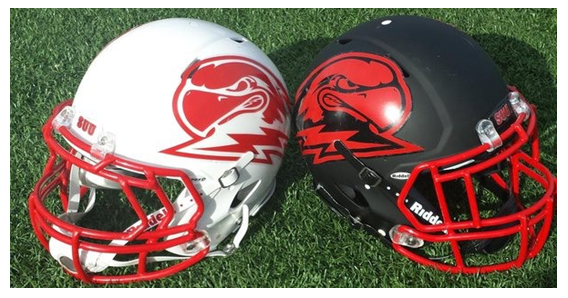 | Figure 1. North American Football Helmets (Image courtesy of Southern Utah University Athletics) |
2. Methods
2.1. Participants
- The participants for the study are former Southern Utah University football athletes. Participating in this study was voluntary and a consent form was provided at the beginning of the study. The athletes that participated in this study were contacted from an extensive alumni email list that came from the athletic department. The Southern Utah University IRB committee approved this study (IRB Approval: #06-052022a).
2.2. Procedures and Instruments
- A contact list from the athletic department at Southern Utah University was used to gather emails of alumni football athletes. An online survey was sent to the participants through Google Forms. The survey asked for their age, position they played while participating in the sport, and graduation year. The survey had 12 questions and included topics such as personal, professional, and social outcomes and subtopics such as physical and mental health, teamwork and leadership, and building and strengthening relationships. The participants answered the questions using a Likert scale. The measurements where on a scale 1-5, 1 being strongly disagree and 5 being strongly agree.The Google Form survey was sent to the participants on June 17, 2022, with an email containing formal instructions, purpose of the study, time it would take to complete, and the end date of the study. The participants had 4 weeks to complete the survey.
2.3. Analysis
- Data for all responses were collected using a Likert scale. The number of responses were recorded to determine the percentages with respect to the pertinent construct.
3. Results
- The total number of participants who submitted the survey was 37. The survey was conducted over a course of a 4 week period. The athlete age demographics are located in Table 1 where: 10.8% of the respondents were ages 20-29 years, 24.3% were 30-39, 16.2% were 40-49, 21.6% were 50-59, 16.2% were 60-69, and 10.8% were 70-79 years old. Tables 2-4 provide the responses regarding: Personal Life, Professional Work, and Social Development respectably.
|
|
|
|
4. Discussion
- The purpose of this study was to examine the positive influence of past sport participation using a survey containing topics of personal, professional, and social development. This study evaluated the qualitative data [13] based on the responses from former collegiate football players. Many studies have shown that the influence of sports has a positive effect on an athlete throughout different stages and areas of life [5,10,14]. Based on the aforementioned studies, it was hypothesized that past sport participation would have a positive influence on an athlete’s life, particularly those who participated in sport of college football. It was hypothesized that these athletes who participated in college football would identify successes in their personal, professional, and social development that stem from their experiences playing the sport.As shown in the results section, the data supports the hypothesis that participation in college sports has a positive influence regarding an individual’s the personal, professional, and social areas of life. The positive influence of past sport participation in participants personal life is shown in Table 2. Overall, 43.2% of respondents were influenced to stay physically fit and active post athletics. Responses to question 2 showed that 51.4% of participants maintained good mental health post college football. Approximately 40.5% agree the standards, morals, and principles taught by the coaches, team, and school influenced them in a positive way. In general, 56.8% of respondents strongly agreed that competing in college football influenced them in a positive way.The positive influence of past sport participation in professional development is shown in Table 3. When participating in college football 45.9% of former athletes strongly agreed it gave them the skills necessary to succeed in the workplace. Approximately 45.9% agreed playing college football allowed them to work better with co-workers. Likewise, 48.7% agreed that they have better leadership skills that positively influence their work life. Finally, 37.8% of respondents agree past sport participation has set them apart in the workforce.The social development of a past sport participant is shown in Table 4. Approximately 43.2% of participants who participated in college football agreed that the sport made them a better brother, husband, or father. Likewise, 48.6% of participants agree college football gave them the tools necessary to build and strengthen their family through daily communication, cohesion, selfishness, etc. Additionally, 48.6% also agreed that football played a role in integrating goals to achieve success in the family. Lastly, 42.3% of participants agreed that college football has played an important role in developing a good culture in their family unit. Studies have shown that there is a correlation between sport participation and the likelihood of fitness upkeep, reducing stress, and perceived improvement in self-confidence [15,16,17]. For the purposes of this study, physical activity is defined as the improvement of human functions in a mechanical way and mental health is defined as the psychological well-being of an individual [18,19]. In contrast, there are also suggestions that past sport participation can lead to low activity rates in retired athletes due to the identity and behavior changes involved in transitioning out of a sport [20]. Participants in the current study reported both mental and physical benefits and challenges following post sport participation. Past sport participation may have a positive correlation to success in the workforce. Leadership plays a big role in the work environment and can be described as motivating and supporting others to achieve a goal [21]. Being able to support others through good communication and cooperation with the intentions to solve problems and achieve goals in a team dynamic is crucial to workplace success [3,14,22]. Past sport participants may have an advantage in this area compared to non-athletes who may not have had experiences developing such skills [14,22,23]. As such, this study serves to support the literature that past sport participation can improve the success in future work endeavors. Similarly, studies have suggested that sport dynamics greatly increases the transferable skills needed to succeed in the work force if application of those skills are continually practiced [11,12,24].In further discussion, the family unit, as described in this study as social development, also benefitted from the positive influence of sport participation. The similarities between sports teams and families can be seen through specific roles, team building project implementations, selfless interactions, communication, and common goal achievements [10,25,26,27]. With the support of this study and others listed, past sport participation appears to have a positive influence on athlete’s social development.There are two limitations in this study. First, the age range of the participants was very wide and the number of participants was low. The concern for the age gap is because the game of football has changed through the years. There is the potential that specifics to individual, professional, and social development may be different based on when the athlete participated in the sport. Second, the participants of this study have different backgrounds and personal situations which can result in a response bias based on the difference in personal, professional, and social successes in addition to the individuals sport experience.A future area of research is examining whether injuries during football played a role in the athletes personal, professional, and social development post sport participation. Specifically, the topic of concussions as related to post athletic participation should be examined. Have head injuries such as concussions and CTE influenced college football players in the 3 phases of life (as described in this study) post athletics? Another area of research could include a longitudinal study where athlete cohorts are observed over an extended period of time for the purpose determining the impact of sport participation on their personal, professional, and social environments.
5. Conclusions
- Within the parameters of this study, characteristics such as teamwork, hard work, goal setting, leadership, and cohesion appear to be beneficial towards personal, professional, and social development. Each athlete’s sports sojourn differs from that of another, but past sport participation can be a positive influence.
 Abstract
Abstract Reference
Reference Full-Text PDF
Full-Text PDF Full-text HTML
Full-text HTML